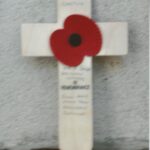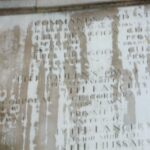Service number: 6888 | Rank: Trooper | Regiment: Dragoon Guards
Killed in action, October 16 1914, in Flanders.
Remembered at PLOEGSTEERT MEMORIAL, COMINES-WARNETON, Hainaut, Belgium.
WHAT I KNOW ABOUT LEONARD …
Leonard was born to a Brandon gunflint maker, William Carter, and it was this trade that Leonard’s older brothers followed into when they left school. However after a short while one of those brothers, Albert, decided that flintknapping was not for him and in 1905 he joined the Army and, as a career soldier, served overseas in the Middle East and India. During that time Leonard had grown up and left school and for 3½ years he worked as an apprentice blacksmith, until one day in January 1906 he took a medical in Norwich and followed his brother into the Army. The Army put Leonard’s blacksmith skills to good use and made him a farrier, shoeing the horses, and in fact according to his Service Record it was noted that he was a hard working blacksmith.
A year or so into Army life Leonard’s conduct deteriorated and on several occasions he found himself stood before his superiors to explain his poor discipline. At first his minor misdemeanours, such as the occasional episode of not complying with their orders or being absent from his duties, saw him confined to barracks for a few weeks with a loss of leave and pay. However on one occasion he was found sleeping at his post which was a much more serious crime in the Army; and for this misdemeanour he was held in detention. On 20th August 1907 he paid more dearly for his actions when he was admitted to a military hospital suffering from a dose of gonorrhea. This was a dose so severe that he was kept in hospital for twenty-one days. Leonard’s behaviour did not improve and another entry on his defaulter sheet stated that he was caught washing down a horse in a water trough that was being used to hold drinking water for the unit’s horses. Perhaps the strangest charge made against Leonard came in December 1911 when he was found guilty of “selling a stray dog without taking steps to find the owner”, a crime for which he was punished with 14 days detention. He was also stationed in Egypt and whilst there he visited the local swimming baths only to slip and fracture an ankle, which once again resulted in him coming off active duty.
Leonard’s Army career took a turn for the better when, on 11th November 1912, he received a promotion to Lance Corporal and perhaps now Leonard could put his past behind him and improve his conduct. Sadly this was not the case and four months later Leonard was found drunk whilst on duty. His NCOs were queuing up to give eyewitness statements in order to condemn him. He was stripped of his lone stripe and demoted back down to Private. A year later, in 1913, Leonard was discharged from the Army for not being “up to the standard” and, aged 26 years old, his name was placed on the Army Reserve list.
Following eight years of service for his country it seemed Leonard no longer has a place in the Army, but that all changed when Britain declared war on Germany. The following day, on 5th August 1914, he was served with his mobilisation papers and was called up to be one of the first to go to France to fight. On 22nd August, his Battalion, the 4th Dragoon Guards, had the distinction of being the first British Regiment to go into action against the German Army. Although Leonard’s own personal involvement was not recorded, we do know that about three weeks after this event he was dead. News of Leonard’s death was relayed to one of his sisters in a letter from a comrade, Private P. Frost …
“It is my painful duty to inform you that your dear brother Leonard was killed in action at Le Gheer, near St Ives, on or about 11th October … I and Leonard were the best of chums. I knew him when he worked at Great Barton, also when he came home from the 7th Dragoon Guards … He died a hero’s death. We buried him beside a Railway Station, and erected a little wooden cross on his grave.”


